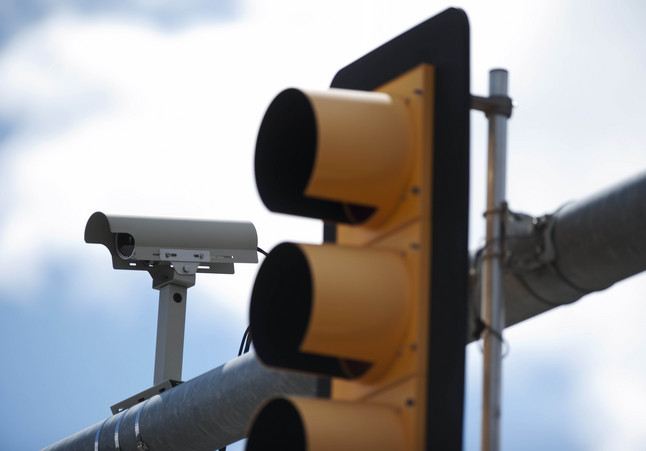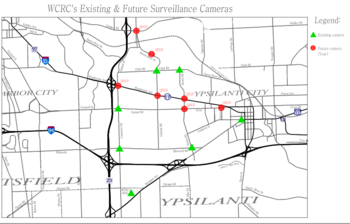Clik here to view.

The Washtenaw County Road Commission's installation of wireless broadband interconnections and traffic surveillance cameras began in 2011 with $1.2 million worth of funding from the federal Congestion Mitigation and Air Quality Improvement Program. There are currently nine cameras in place and the $490K expansion project would add seven more in 2013.
Daniel Brenner I AnnArbor.com
The 2013 Signal Interconnect Project would begin this summer, using $490,000 from the federal Congestion Mitigation and Air Quality Improvement Program to add wireless connections to 13 intersections and traffic surveillance cameras to seven of those intersections.
Clik here to view.

The green markers represent places where traffic surveillance cameras have already been installed and the red markers represent places that will receive them as part of the 2013 expansion. Though not featured in the map, there are also cameras on Jackson Road at the Zeeb Road intersection and the Baker Road intersection.
Courtesy of the WCRC
The 2013 plans are an expansion of an existing project that began in 2011. That project already has included the installation of wireless connections and surveillance cameras to nine intersections and the integration of those devices into a central traffic system. WCRC staff are then able to monitor traffic flow and adjust the timing of traffic signals remotely.
"To have somebody sit at multiple intersections during peak time is not possible, especially with our limited staff," said Brent Schlack, project manager for traffic safety at WCRC. With the wireless connections and cameras, he said one person can view multiple intersections and make adjustments right then by viewing the camera.
Schlack said none of the data from the cameras is recorded and no one spends a tremendous amount of time watching them. He said WCRC technicians usually check the cameras in the morning to make sure everything is working properly. They also check them whenever they receive complaints about traffic signals that are damaged, malfunctioning, or that are timed poorly.
The existing project cost $1.2 million and also was funded by CMAQ. Roy Townsend, managing director of the WCRC, said the expansion costs significantly less because the WCRC has completed the installation of the necessary technological infrastructure to support the central traffic system, including towers for the wireless signals.
Although the system has only been used for traffic purposes, Schlack said the WCRC has met with officials from the Washtenaw County Sheriff's Office and Pittsfield Township Police Department about the possibility of expanding its uses.
Sheriff Jerry Clayton said WCSO only has had preliminary discussions with the WCRC about using the wireless surveillance system to enhance the efficacy of the county's dispatch center.
"It would enable our dispatch service to better send emergency response resources to critical incidents that occur throughout the county," Clayton said. "The focus for us is public safety, better delivery of service. If partnering with the road commission will better enable us to do that, then we’re very interested in doing it."
The WCRC is collaborating with the Michigan Department of Transportation for the 2013 expansion, because MDOT owns the traffic signals along Washtenaw Avenue, a state road. Though, MDOT is not contributing funding.
"We would be connecting and bringing them into our system, but ultimately they would be owned by the state," said Sheryl Soderholm Siddall, director of engineering for the WCRC.
- View a map of the locations of the new and preexisting traffic surveillance cameras here. NOTE: Though not featured in the map, there are also cameras on Jackson Road at the Zeeb Road intersection and the Baker Road intersection
- View a diagram of the 2013 installation of wireless broadband interconnections and traffic surveillance cameras along Washtenaw Avenue here.
- View a diagram of the 2013 installation of wireless broadband interconnections and traffic surveillance cameras along Clark Road, Huron River Drive and Dixboro Road here.
Kody Klein is an intern for AnnArbor.com. Reach him at kklein@mlive.com